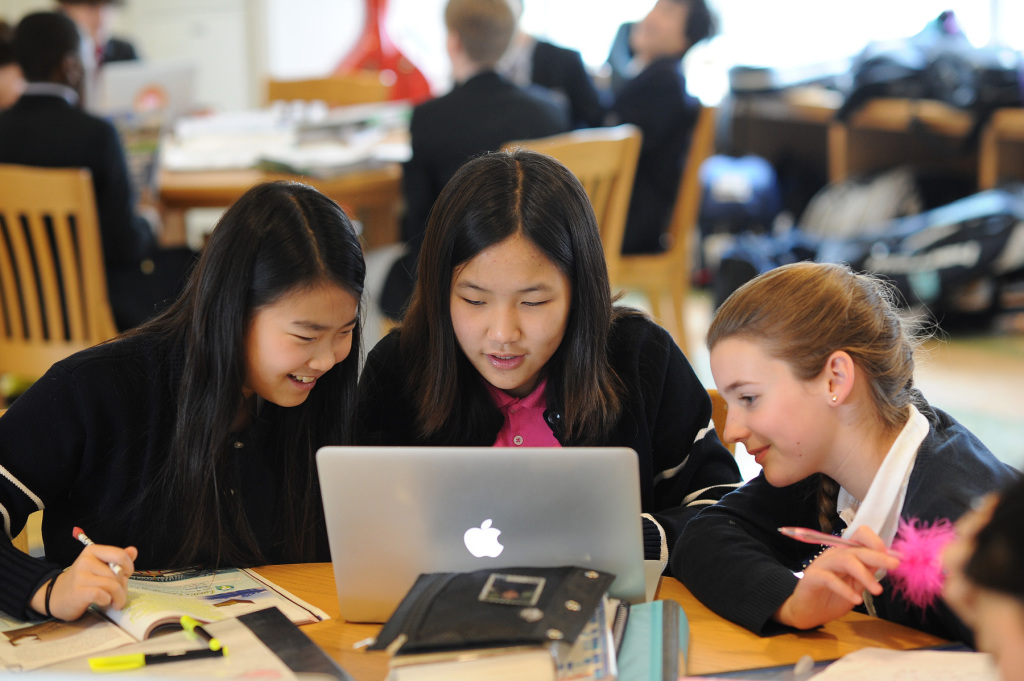Phoebe Christos ’18: One-to-One, a program that provides students with a personal laptop, is in the process of expanding to the Upper School. Dr. Catherine Hall, Assistant Head of School and Former Director of Technology, said, “We want the laptops to be tools that the students and faculties can actually use to generate different ways of teaching and learning.”
After many years of research and discussion about its benefits and drawbacks, the One-to-One program was initiated at the Episcopal Academy in 2012. “One-to-One programs have been around for a very long time…Since laptops have become affordable, schools around the country have been exploring the way to do this,” noted Hall.
In the decision of whether to adopt the program or not, Episcopal had to weigh many factors. “There are a lot of schools and programs that have put a lot of money into [One-to-One] and failed. What they have discovered is that it’s not just about handing the computer to the student- they need to change their program and get the school and teachers to incorporate [the technology],” explained Hall. “The schools that have to abandon the program usually did not think thoroughly enough about all of the changes that should occur for it to be successful.”
Although Episcopal Academy adopted the program just three years ago, it has come a long way since. “We began with just the fifth grade back in 2012, but this year we added a modified One-to-One program in the fourth grade. The students do not take the computers home, they stay in the classroom, but there is one computer for every fourth grader,” Hall elaborated. “Now, three years later, we have the program in grades four through eight.”

Photo Courtesy of Michael Leslie
“The One-to-One program is and has been a great program that has allowed me and my peers to learn and interact with the newest technology,” remarked Ellie Baggini ‘20, a member of the seventh grade into which the program recently spread. Riya Mukherjee ‘23, current fourth grader at Episcopal Academy, commented, “I like the One-to-One program because it makes us more independent since we have to take care of our own laptops.” He continued, “The program has made everyone more focused because we are interested in the learning games that we play on our laptops.”
There are, however, a few drawbacks to the program. “It takes a lot of time and money [and]… creates many different challenges… Whether or not the children are staying focused with a screen that we cannot see. We don’t want to police every single thing that the students do during class,” Hall admitted.
Hall also referenced a future in which textbooks could potentially be a thing of the past, saying, “Some e-books are available. We are working with our textbook vendors to see if, at all possible, we can offer e-books next year for Upper School students. I think that eventually textbooks will be fully replaced by e-books.”
The future of One-to-One is bright, as teachers will be undergoing training in order to adapt once it reaches the Upper School. Hall added, “We are heading into some pretty robust development for teachers- everything from classroom visits to simple conversations with certain departments. [The developments] will be ramping up a lot over the summer.”
Hall praises the program’s ability to expand a teacher’s methods for connecting with his or her students, saying, “It is very empowering for our students. Every student [now] has the tools [to learn] in the classroom and at home. Prior to the program, it was a little less equitable and we did not have the power of that resource. [One-to-One] gives the students the incredible opportunity to connect…not just with each other, but globally and nationally. The program simply transforms the learning space.”